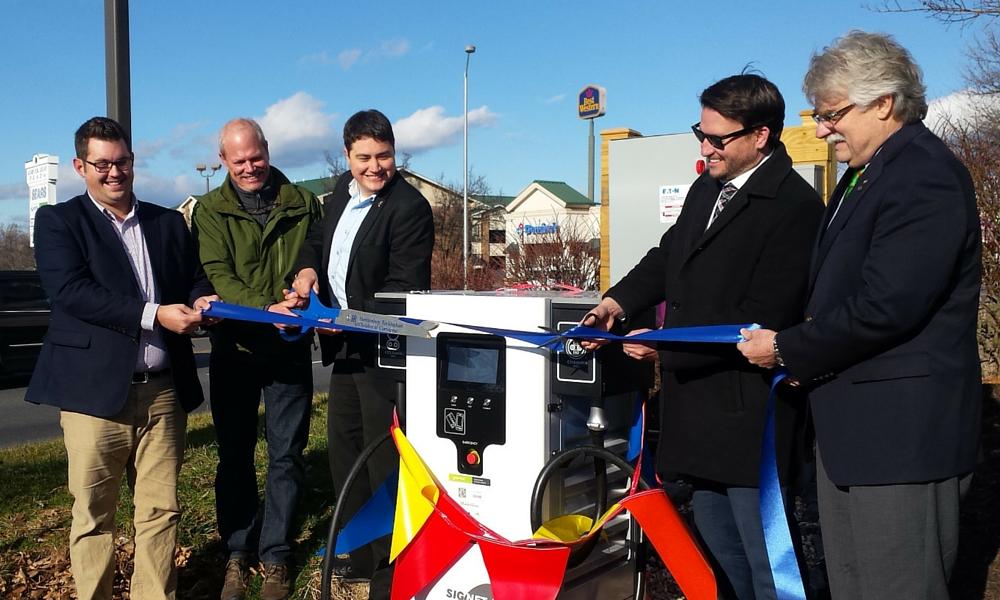Promoting Clean Energy in VA
Research and Scholarship
SUMMARY: Virginia Clean Cities, a nonprofit working to reduce transportation petroleum consumption and the associated emissions by advancing the use of alternative fuel vehicles and infrastructure, established a partnership with JMU in 2009.
According to the U.S. Energy Information Administration, in 2013 the Commonwealth of Virginia released over one hundred million metric tons of CO2 emissions into the air (an amount equivalent to emissions released from 11.3 billion gallons of gasoline). Although Virginia produces little to no oil of its own, the majority of those CO2 emissions result from the use of petroleum products, with transportation and shipping vehicles generating just over half of those emissions (51 percent).
Several areas of Virginia persistently produce amounts of pollution that exceed the national ambient air quality standards set by the U.S. Environmental Protection Agency (EPA). As air pollution continues to impact global health and the Earth’s climate, there has never been a more important time to support clean energy options for Virginia. Alleyn Harned, Executive Director of the nonprofit Virginia Clean Cities, is working to do just that.
“Our department runs grants for air quality improvement while also trying to reduce Virginia’s dependence on oil,” Harned explained. “We do whatever we can to help improve the state’s quality of life—both by creating clean energy jobs and fighting climate change.”
Virginia Clean Cities (VCC) was formed as a non-profit in 2001 to manage the Clean Cities Coalition that was first sponsored by the U.S. Department of Energy in 1996. Harned joined VCC in 2009, when the nonprofit first formed its partnership with James Madison University. As Executive Director, Harned provides overall guidance and leadership for a five-person staff (including an intern), develops proposals, and spearheads projects to connect organizations in both the public and the private sector with the resources needed to pursue clean energy options in Virginia.
One of the projects VCC is currently overseeing, the Vehicle Emission Reduction, Deployment, and Education (VERDE) Project, involves a partnership with the EPA to help lower the amount of emissions generated by trucking fleets operating in the Commonwealth. The project aims to both replace heavy duty vehicles with cleaner fuel vehicles, as well as install emissions controls and idle-reduction technologies. The idle-reduction technology is particularly impactful, as it will allow refrigerated trucks to park in electrified parking spaces that provide the necessary power to keep cargo cold without running the truck’s engine.
“Up until this point, truckers had to let their vehicles idle all night because they didn’t have any other option. Idling creates incomplete combustion, which is horrible for air quality,” Harned explained. “Now, truckers will be able to park overnight and run their refrigerated trucks through grid electricity, which is a lot cleaner and just generally low emission.”
VCC is currently working on several ongoing projects including a website database designed to expand the domestic supply chain of hydrogen fuel cells, a Virginia Port Authority Green Operator Program designed to provide truck drivers with the resources and incentive to retrofit or replace diesel drayage trucks, and a mentoring program designed to support other Clean Cities Coalitions across the country to name a few.
“I came on board with JMU, working directly with JMU Research and Scholarship, because JMU is a leader both in clean vehicles and in collaborative leadership. I found great partners in JMU, and through this office we’ve also been able to partner with a wide array of Virginia businesses,” said Harned. “We get involved more in the community and we get to invest in people.”
When asked what one of his favorite VCC projects has been, Harned described the Mid-Atlantic Biofuel Infrastructure Partnership. The $5,000,000 project aims to increase the use of biofuels in the Mid-Atlantic region by building new ethanol fueling stations and strengthening the infrastructure of the biofuel industry throughout Virginia, Maryland, and D.C. The project will connect private sector companies with the resources to build 41 new ethanol stations—nearly 200 additional pumps—across the entire region.
“Writing a grant is like coloring in a coloring book. You’re given the outlines and you get to fill them in with your colors—your ideas,” explained Harned, who wrote the grant that made the Biofuel Infrastructure Partnership possible. “I saw the opportunity, started setting up a team, identified partners, and we ended up landing a $5,000,000 federal project. We were able to step up and fill a hole—Maryland couldn’t do this without the help of Virginia, and Virginia couldn’t administer the project either without a group like VCC to help organize things. It was just such a wonderful experience to have an idea come back with this much support.”
